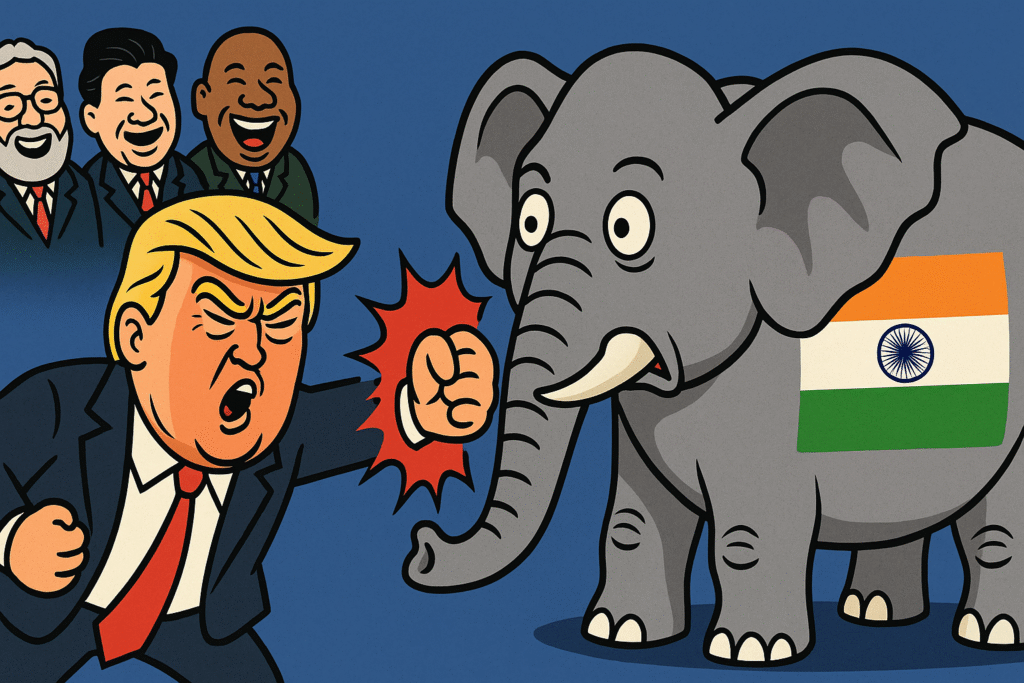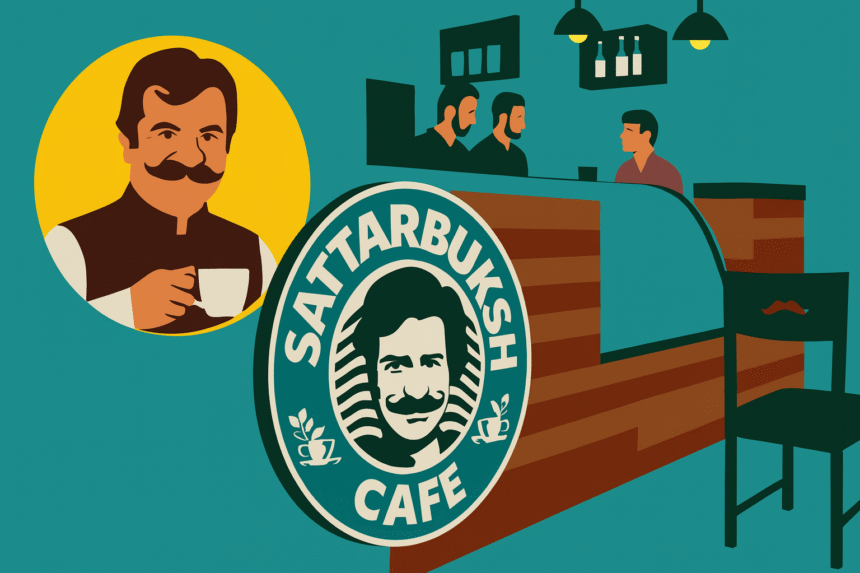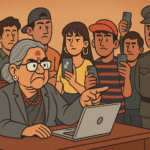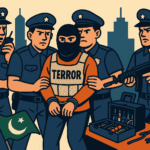A Pakistani café named SattarBuksh just won a 12-year legal battle against Starbucks. The David vs Goliath case that brewed global laughter.
- How It All Began – A Name Brewed with Wit
- Starbucks Was Not Amused
- The Court Battle – Latte With a Side of Legal Drama
- Why Did SattarBuksh Win?
- Starbucks with Masala – The Menu Difference
- The Internet Couldn’t Stop Laughing
- A Desi Dupe That Refused to Die
- Why This Matters Globally
- FAQs – Brewing the Basics
- The Smile-Worthy Punchline
- Related Post Suggestion
When you think of coffee wars, you imagine latte art competitions or debates over cold brew. But in Pakistan, the ultimate caffeine clash wasn’t about beans. It was about a moustache taking on a mermaid—and winning.
Yes, ladies and gentlemen, welcome to SattarBuksh vs Starbucks, the court battle no one ordered but everyone enjoyed sipping on.
How It All Began – A Name Brewed with Wit
Back in 2013, two Pakistani entrepreneurs, Rizwan Ahmad and Adnan Yousuf, decided to open a café in Karachi. Instead of picking a boring, standard name like “Coffee House,” they went for something bolder—SattarBuksh.
The name was a quirky mix:
- “Sattar,” a common local name.
- “Buksh,” which in Urdu means servant.
Together, it became SattarBuksh—essentially “Sattar, the servant.” A name so desi, it felt like chai-spilling gossip at a family wedding.
But the real kicker? Their logo looked suspiciously like Starbucks’. Except, instead of the green mermaid, it had a moustached man staring back with peak South Asian uncle energy.
Starbucks Was Not Amused
Of course, the global coffee giant didn’t take this lightly. Starbucks sent a legal notice, claiming copyright and trademark infringement. From their point of view, SattarBuksh was not parody—it was piracy.
But the Pakistani café didn’t back down. Instead, they tweaked their branding, argued it was satire, and stood their ground.
And what followed was a 12-year legal brew of David vs Goliath proportions.
The Court Battle – Latte With a Side of Legal Drama
For years, Starbucks fought hard to shut down SattarBuksh. They argued the name, logo, and branding were too close for comfort.
But SattarBuksh defended itself brilliantly:
- The name was locally rooted and witty.
- The moustached man was clearly not a mermaid.
- Their menu and vibe were uniquely Pakistani—burgers, sandwiches, desserts, even shisha (try finding that at Starbucks!).
The court, after 12 years of brewing the case, finally ruled in favor of SattarBuksh. The little café that began as a parody officially outlasted a global coffee monopoly.
Why Did SattarBuksh Win?
The victory boiled down to parody vs piracy. Starbucks claimed SattarBuksh copied. SattarBuksh argued they were mocking—adding cultural masala to an international brand.
And parody, as several legal systems worldwide recognize, often counts as free expression. (You can dive deeper into how parody plays in intellectual property law via this World Intellectual Property Organization analysis).
Simply put: the moustache wasn’t stealing. It was laughing.
Starbucks with Masala – The Menu Difference
What really separated the two wasn’t just the moustache vs mermaid fight. It was the menu.
Starbucks may have its Pumpkin Spice Latte, but SattarBuksh had:
- Burgers that felt like street-food-meets-café fusion.
- Sandwiches served with desi flair.
- Desserts for sweet tooths who like their sugar bold.
- Shisha—because nothing says café culture in South Asia like a good hookah session.
So while Starbucks offered a globalized, standardized taste, SattarBuksh offered Starbucks with masala.
The Internet Couldn’t Stop Laughing
As soon as the court verdict came out, memes flooded social media. Some of the best ones included:
- “From mermaid to moustache—evolution of coffee branding.”
- “Starbucks lost because they underestimated the power of the ‘uncle’.”
- “Global monopoly defeated by chai-sipping humor.”
It quickly became a story not just about coffee but about wit, satire, and cultural identity.
A Desi Dupe That Refused to Die
Managing Director Armaghan Shahid explained it best: Starbucks tried everything to shut them down but failed. Their brand identity may look cheeky, but the details are distinct.
The café became not just a parody but a phenomenon. What began as a joke turned into a business empire, now firmly rooted in Pakistani café culture.
Why This Matters Globally
This isn’t just about coffee. It’s about how parody and humor can sometimes outplay even the mightiest of corporations.
Think of it this way: Starbucks has over 16,000 outlets globally. Yet in Pakistan, SattarBuksh stood tall as the ultimate underdog.
It’s a reminder that while corporate giants brew consistency, local humor brews authenticity.
And sometimes, authenticity wins.
FAQs – Brewing the Basics
1. What is SattarBuksh?
A Pakistani café inspired by Starbucks, known for its witty name and moustached-man logo.
2. Why did Starbucks sue them?
Because the name and branding looked too similar to Starbucks’ iconic logo.
3. How did SattarBuksh win?
By convincing the court it was parody, not piracy.
4. What’s on their menu?
Coffee, burgers, sandwiches, desserts, and even shisha.
5. Why is the story trending?
Because it’s a classic David vs Goliath case where humor and culture beat a global monopoly.
The Smile-Worthy Punchline
So here we are in 2025. Starbucks may still be the global giant, but SattarBuksh stands as the moustached legend that brewed a victory nobody saw coming.
In the end, it wasn’t just about coffee. It was about wit, identity, and the sweet, sweet taste of underdog success.
Would you sip coffee at SattarBuksh if you had the chance? Drop your thoughts below! ☕👇
And if you love stories of underdogs taking on giants, share this blog with your friends—the world needs more moustache-powered victories.
Related Post Suggestion
“Trump’s 50% Tariff: Like Mouse Punches Elephant”
Turns out, the moustache was mightier than the mermaid.













